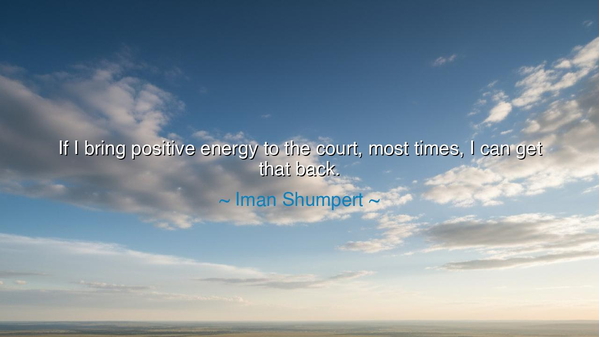
If I bring positive energy to the court, most times, I can get






Hear the words of Iman Shumpert, a warrior of the hardwood, who declared: “If I bring positive energy to the court, most times, I can get that back.” Though he spoke as an athlete, these words reach beyond the arena of sport and into the field of life itself. For they reveal a truth as old as the rising sun: what you send forth into the world returns to you, just as the echo answers the shout, and the harvest mirrors the seed.
The origin of this saying lies in Shumpert’s years as a defender, teammate, and competitor in the realm of basketball. He was never the flashiest scorer, nor the most glorified star, but he understood the unseen laws that govern the game. He knew that victory is not born from talent alone, but from spirit—the energy you bring to your companions, to the moment, to the struggle. When he brought positivity—encouragement, enthusiasm, relentless effort—he found that it inspired his teammates and returned to him multiplied in the form of unity, momentum, and triumph.
History, too, testifies to this law. Consider the story of Florence Nightingale, who walked into the horror of war hospitals filled with suffering. Where others carried despair, she carried light, faith, and positive energy. Her presence transformed not only the patients but also the nurses and soldiers who witnessed her. The hope she gave returned to her in courage, strengthening her to reform medicine and save countless lives. Just as Shumpert saw on the court, she proved in the battlefield of blood and sickness: what you bring forth, you will receive in return.
The deeper meaning of Shumpert’s words is this: energy is contagious. A sigh of despair can weaken a room, but a spark of joy can ignite it. In teams, in families, in nations, the atmosphere is shaped by what each person contributes. To bring positive energy is to choose to uplift rather than drag down, to inspire rather than discourage, to create harmony rather than division. And when many bring such energy together, the result is greater than any individual’s strength.
The lesson is clear: if you wish to receive support, bring encouragement. If you long for joy, sow joy into the lives around you. If you desire unity, bring respect and understanding to your companions. Life, like the court, is a place of constant exchange, and you will often be given back what you yourself have offered.
To the youth, I say: do not wait for others to inspire you—be the one who brings the flame, and watch how others begin to shine. To the weary, I say: when life feels heavy, remember that your spirit can still be a beacon; often by lifting others, you will find yourself lifted as well. To the leaders, I say: the energy you bring to your people will be mirrored back to you. Sow bitterness, and you will reap bitterness; sow hope, and you will reap loyalty and strength.
Practical action lies before us: begin each day with the conscious choice to bring positive energy wherever you go. On the field, in the classroom, in the workplace, let your words be encouragement and your effort be steady. Smile when others frown, offer strength when others weaken, and persist when others falter. In doing so, you will not only change the atmosphere around you, but you will find yourself renewed, strengthened by the very energy you set free.
Thus Iman Shumpert’s words endure, not only as the wisdom of an athlete, but as a universal law of life: the spirit you bring forth will return to you. Bring positive energy, and the world itself will answer in kind. This is the way of teams, the way of families, the way of all who wish to build a brighter tomorrow.






TANinh The Anh
This quote reminds me of the importance of mindset and attitude in any team setting. Iman Shumpert’s belief that positive energy can be returned is an uplifting way to approach not only sports but life in general. But can positive energy alone guarantee success, or are there other factors at play, like skill, strategy, or timing? How do we balance optimism with practicality in highly competitive situations?
QTpham ngoc quynh trang
Iman Shumpert’s quote about positive energy really resonates with the power of mindset. It seems that if you focus on positivity, you’re more likely to attract it in return. But what happens when you bring positive energy but don’t get the same response from others? Is it possible to maintain that optimism even if the environment feels draining or negative? How do you stay grounded when your energy isn’t reciprocated?
AKAn Khai
I really like the idea of bringing positive energy to the court and expecting it to be returned. It seems like a great way to not only boost your own performance but also uplift your teammates. But can this idea of positive energy be applied universally? How can we ensure that our positive attitudes don’t clash with others’ moods or get misunderstood, especially in competitive environments?
SSSi Si
Iman Shumpert’s quote highlights how positive energy can create a positive feedback loop. It’s refreshing to think that our mindset can influence the outcomes of a situation. But is it always possible to stay positive in challenging environments, especially in high-pressure situations like a basketball game? How do we keep our energy up when things aren’t going our way, and how can we ensure that this positivity truly impacts those around us?